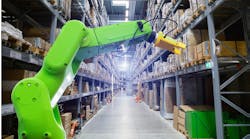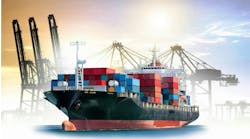Overall, fluid power distributors had a good 2014 and seem poised to sustain that momentum through 2015. A major reason is their growing emphasis on engineering services and other value-added offerings.
Rock Able, president of the fluid power division of Cross Company in Greensboro, N.C., said that 2014 was a strong year for the distributor in general and especially for its fluid power division.
“For my particular business division, it was a really good year,” Able said. “We were up almost 12 percent over the prior year. We had been down about three or four percent [in 2013]. So we made that up, plus some pretty good growth.”
Kevin Kampe is president of Womack Machine Supply, headquartered outside of Dallas, in Farmers Branch, Texas. Womack also had strong sales numbers for 2014, he said. Kampe estimates that fluid power represents about 95 percent of the company’s business.
“[It] was a good year for Womack,” Kampe explained. “We exceeded our budget expectations.”
The good 2014 numbers can’t be traced to any new innovation that catapulted sales. Lighting distributors, for example, can point to the emergence of LEDs as a source of profits in recent years. There is no parallel in fluid power, both Kampe and Able agree.
“Hydraulics and pneumatics are a fairly mature market, in my opinion. There hasn’t been any revolutionary technology to come out in the last 50 years, so to speak,” Kampe explained. “I think the controls side of it is where the big steps have been made … We have all the motion control discipline under one roof. So if the customer wants a pneumatic application, we have it. If they want a hydraulic application, we’ve got that. If they want an electromechanical solution, we have it. We are able to offer the customer three different technology solutions that can do the same type of application.”
Able concurs, adding that Cross’ strong numbers weren’t “really [due to] any new products, but more a continuation of things we have been working on,” he said, referring to an ongoing emphasis on the company’s value-added offerings. Foremost among them for Cross is its engineering skills, Able said.
“Mostly, what we have done is become an extension of our customers’ engineering departments,” Able explained. “We have an engineering department right now that has seven application engineers in it. And four of those are dedicated to electronics—programming and developing electronic PLC controls and HMI displays for mobile equipment and interfacing that with the Tier 4 diesel engines.”
The growing demand for Tier 3 and Tier 4 engines has driven Cross Company’s fluid power customers, Able explained.
“A few years ago, when we started selling electronics and mobile PLCs, we had a lot of customers who were saying, ‘I don’t want that electronic stuff on my machines,’” Able said. “But … now it has to be on their machines and they have to be able to interface with the engine. So now they see the additional control and the capabilities and enhancements that we can provide. So that business has been growing just constantly over the last four or five years at a pretty good clip.”
Able expects such demand to continue in 2015.
“This coming year should be no different,” he said. “Anybody that is developing new platforms has got to have that capability. They don’t have the people in house to do the programming and the engineering so they look to us to do that.”
The Technical Experts
At Womack, the distributor also offers the services of on-staff engineers, Kampe explained.
“We have a systems group called Womack Systems, LLC. That is our value-added systems group, and that is where we do all of our engineered products and solutions. We have engineers on staff there. That is where we provide our custom systems such as hydraulic power units and electrical control panels,” Kampe said. “We also do value-added assemblies. So primarily for us, the value add is all of our systems solutions—any custom hydraulic power units. We also do a lot of custom electrical control panels and assemblies. And we do a lot of manifold assemblies and [other] value-added packages.”
Cross’ fluid power division sells primarily to an OEM customer base, Able explained.
“We’re focused primarily on small and medium-sized OEMs,” he said. “We are calling on the smaller guys that manufacture railroad track maintenance equipment, that manufacture asphalt paving equipment, that manufacture chippers and stump grinders—[also] different kinds of construction equipment and utility equipment.”
Much of Cross’ value-added engineering services are aimed at these OEMs.
“The technical services part of our business is a key element of our strategy,” he explained. “We are investing in that and we are trying our best to establish ourselves with the OEM customers as the guys who can do what your engineering department can’t do and we can interface with them to develop the kind of machinery that your customer wants.”
Like Cross, Womack has seen an increased demand for these value adds, Kampe explained.
“[Demand for value-added services] has been increasing as customers have reduced their own engineering staffs and people with expertise in fluid power have diminished somewhat,” Kampe said. “So our customers have relied on us more and more with regard to specification and engineering work to make sure that they have the best technology on the machines they build.”
Womack is also OEM-focused as far as its general fluid power customer base goes, Kampe said.
“The lion’s share of our business is with OEM customers, with equipment builders and custom machine builders,” he said. “So we are very heavy on the OEM side of the business.”
Womack also does its share of what Kampe described as “user business”—to distinguish its work from MRO-related lines (maintenance, repair, and operations).
“We don’t call it MRO business. To us it is more ‘user business.’ We do make that specific distinction. We believe that there is more value add to what we describe as ‘user business’ than simply MRO,” Kampe said. “So we go into the plant facilities and try to solve problems for customers.”
As an industry veteran, Able says he’s seen a lot of ups and downs, and he points to Cross’ survival of the economic recessions of 2001 and 2008. That 2001 slump was “absolutely the hardest and worst time of my professional career,” he recalled of a time when Cross “… could not afford to keep the people that we had working for us.”
But he is clear-eyed and upbeat about 2015.
“You know, everybody suffers if the economy crashes,” Able said. “But we don’t see that happening anytime soon. Right now, most of the markets are moving in a fairly positive direction.”
Kampe is equally philosophical about how 2015 will go.
“We have such a very small market share in the region that we cover, and the fluid power and automation market is so massive,” he explained. “A lot of things change every single year and we have massive fluctuations in oil and gas. But we have so much, as we like to say in the South, ‘to say grace over.’ We have plenty of places to go to sell solutions to customers.”








